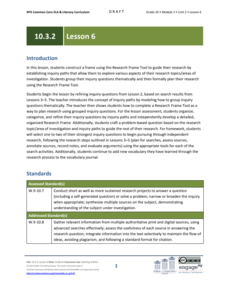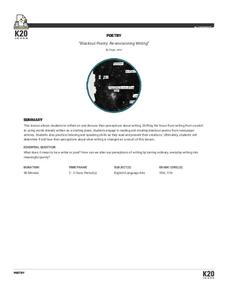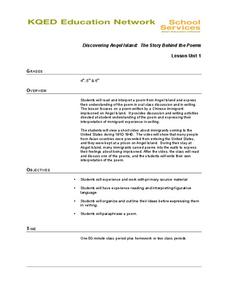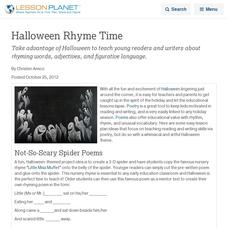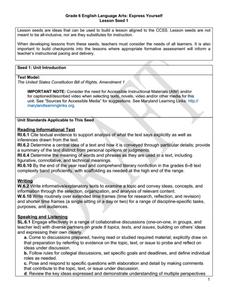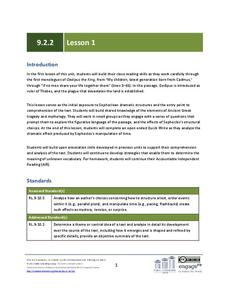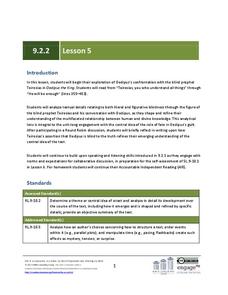EngageNY
Grade 9 ELA Module 4, Unit 1, Lesson 20
After comparing the working conditions of the enslaved people to those of the Indian indentured workers on the sugar plantations, class members examine the conditions and the actions of specific historical figures that Marc Aronson and...
Museum of Disability
A Picture Book of Helen Keller
Teach your class about Helen Keller and her accomplishments with a reading comprehension lesson based on A Picture Book of Helen Keller by David A. Adler. As individuals read, they answer discussion questions about Helen Keller and the...
Poetry4kids
Onomatopoeia Poetry Lesson Plan
Two exercises boost scholars' knowledge of a onomatopoeia with excerpts from famous poems. In exercise one, participants circle onomatopoeia words. Exercise two challenges writers to choose three words to use in an original poem.
Poetry4kids
Personification Poetry Lesson Plan
Scholars take part in two exercises to boost their knowledge of personification. After reading a detailed description and excerpts from famous poems, writers list action verbs and objects then combine words to create a humorous...
EngageNY
Grade 10 ELA Module 3: Unit 2, Lesson 6
Choose your path carefully. When beginning research, learners must figure out which inquiry path to follow. After determining a path, scholars guide their research based on the chosen theme to further refine the questions they...
Curated OER
Can You Figure Language?
Eighth graders study similes and metaphors and how to explain and create them. After a lecture/demo, 8th graders access websites and worksheets imbedded in this plan to create their own writing.
Curated OER
Similes, Metaphors, and Figurative Language
There are creative ways to make similie and metaphor lessons and activities motivating for students.
Curated OER
I Have a Metaphor
Learners locate the literary devices used in Martin Luther King Jr.'s "I Have a Dream" speech. In this figurative language lesson plan, young scholars first distinguish between similes, metaphors, analogies, personification, etc....
K20 Learn
Blackout Poetry: Re-Envisioning Writing
Shed light on the beauty of language with a great poetry activity. After learning about Austin Kleon's blackout poetry model, pupils respond to some of his poetry and use it as a model to produce their own. Young writers also share their...
Curated OER
Figurative Language Scavenger Hunt
Eighth graders analyze and interpret figurative language. They listen to some examples of poetry which use figurative language. Then, they divide into groups and attempt to find more examples. Finally, 8th graders write what the poet is...
Curated OER
Figurative Language - Part Two
Pupils need to use their papers from Part One of this lesson. They then write a paragraph for each term. This exercise help them to use these terms in their writing. Using figurative language makes writing more descriptive and alive.
Curated OER
When I Set My Hat at a Certain Angle: Trying on Zora Neale Hurston's Voice to Dress-up Prose
After reading and evaluating examples of prose nonfiction by Zora Neale Hurston and other authors, high schoolers write a personal reflective essay rich in figurative language. By incorporating this strategy, they utilize voice within...
Curated OER
Analyzing Literary Devices
Eighth graders identify figurative language and poetry in this literary analysis lesson. Using Through the Looking Glass by Lewis Carroll and a YouTube video for "The Walrus and the Carpenter," young readers complete a literary device...
Curated OER
Discovering Angel Island: The Story Behind the Poems
Poems carved into the wooden walls of the Asian immigrant prisons on Angel Island provide upper elementary graders an opportunity to study not only the story behind the poems but to also focus on the figurative language employed by the...
Curated OER
Introduction to Symbolism
Your young readers might know that the stars on the American flag symbolize the fifty states, but what symbols best represent who your students are as people? Use this SMART board presentation to guide learners through an activity about...
Curated OER
Halloween Rhyme Time
Take advantage of Halloween to teach young readers and writers about rhyming words, adjectives, and figurative language.
Curriculum Corner
“I Can” Common Core! 3rd Grade Language
Support third graders with developing their language skills using this Common Core checklist. With each standard written as an I can statement, children are given clear learning goals to work toward throughout the year.
Learning for Justice
Maya Angelou
Maya Angelou's poem, "Still I Rise", offers young scholars an opportunity to consider how poets use literary devices to create powerful messages. After a close reading and discussion of the poem, class members reflect on how they can...
Novelinks
The View From Saturday: Concept/Vocabulary Analysis
Design your unit on The View From Saturday by E.L. Konigsburg with a concept and vocabulary analysis resource. It outlines the plot, literary elements, vocabulary issues, and any possible considerations for planning a differentiated...
Curated OER
Express Yourself Lesson Seed 1
Make a study of the First Amendment and its relationship to freedom. Pupils rewrite the amendment and discuss the central idea before focusing on a specific phrase. After discussing, class members write a journal entry about the included...
EngageNY
Grade 9 ELA Module 2: Unit 1, Lesson 13
Whether the planks hide the beating of a hideous heart or they break away to the madness beneath, their presence makes itself known in the final instructional activity of a literary analysis unit. Having gathered textual evidence from...
EngageNY
Grade 9 ELA Module 2, Unit 2, Lesson 1
Delve into the heart of dramatic dialogue with a unit focused on Oedipus the King by Sophocles. Having completed an online exploration about ancient Greece beforehand, ninth graders read the play's opening lines and analyze how...
EngageNY
Grade 9 ELA Module 2, Unit 2, Lesson 5
Oedipus may be the king, but he certainly does not rule—or see—all. Analyze his interaction with Teiresias in an instructional activity focused on the central idea of Sophocles' Oedipus the King. As pairs of ninth graders discuss...
EngageNY
Grade 9 ELA Module 2, Unit 2, Lesson 7
The accusations begin in Sophocles' Oedipus the King, with troublemakers and enemies abound. As learners delve deeply into the sights unseen, they review textual evidence from their readings to write about the importance of timing in the...






